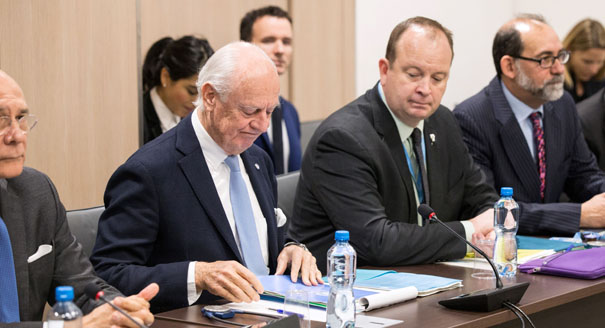Sam Heller | Senior analyst for the International Crisis Group, focused on jihadi organizations and, more broadly, Syria
It’s difficult to see how the Geneva peace process on Syria can be revived, at least at this stage. At most, interested countries can reiterate their existing positions, namely that they will continue to support the Geneva framework and the United Nations special envoy to the Syrian crisis, Staffan de Mistura, and insist that international funds for Syrian reconstruction will only come following a political breakthrough. That’s what we expected from this week’s Brussels donor conference, in addition to some clarity about donor commitments to the humanitarian response to Syria.
But restating those positions won’t advance Syria’s political process. It will only continue the standoff between the Syrian government and the opposition’s respective backers. That deadlock suits the government of President Bashar al-Assad, whose intransigence remains the main obstacle to any internationally sponsored political process. In the absence of a political resolution, his forces can continue to advance on the battlefield. Assad’s government seems close to reaching the geographic limits of what it can retake through brute military means. Going further will likely require some new political tradeoff, brokered in Astana or elsewhere. But it hasn’t hit those outer limits yet.
Nathalie Tocci | Director of the Istituto Affari Internazionali in Rome and special adviser to Federica Mogherini, the European Union’s high representative for foreign affairs and security policy
The international community tirelessly repeats that there is no military solution to the Syrian conflict. Indeed, only a political agreement within Syria and between regional and global powers can bring an end to this catastrophic war. The path to peace, we’re told, may thus pass through the Astana framework but must end in Geneva.
To say that the Syria conflict—as any conflict—can only end with a political solution is a no-brainer. But a political solution requires an end to the military phase of a conflict. Flagging the virtues of a political solution does precious little to encourage military actors to come to the negotiating table, above all those who know they are “winning” the military confrontation. Inadvertently, the recent military strikes in Syria by the United States, the United Kingdom, and France kicked the can of a political solution further down the road. This was not because a targeted military response to a chemical attack was wrong (although a full investigation prior to it would have seemed warranted), but because the Assad regime, which believes in a military solution, now knows that it can pursue its military strategy unfettered, with the support of its allies. At this stage, no one can reverse this trend.
The most acute military phase of the Syrian war may be winding down, but Astana will falter while meaningful progress in Geneva will remain elusive until and unless all parties acknowledge the bitter writing on the wall.
Ammar Kahf | Co-founder and executive director of Omran for Strategic Studies, a Syria-focused policy research center based in Istanbul and Washington, D.C.
Continued military operations by Russia and by the Syrian Army and affiliated militias have resulted in the failure of all rounds of the Geneva talks on Syria, with no end in sight. As a result, the Syrian scene has continued to be a regional and international proxy conflict, and at times one in which outside states have clashed more directly, with the presence of military bases of at least four countries and many non-state militias.
At this point one has to distinguish between the Geneva process and an international political process that includes the main international and regional players involved in Syria. These two are no longer necessarily synonymous. It seems that the recent strikes by the United States, the United Kingdom, and France in Syria were an attempt to bring the other side (namely Russia) back into some sort of a political process, especially after the Russians thought they had gained control over all aspects of the Syrian conflict. As such, there is an indication of a desire to establish a post-Geneva political process.
Maha Yahya | Director of the Carnegie Middle East Center
With great difficulty. To do so, a unified European position must be forged in order to encourage the United States to put forward a predictable Syria policy with some teeth and convince the Russians that Geneva is the only venue where a sustainable peace in Syria can be hammered out and where their interests would be preserved. In turn, the Russians need to exert their influence on Syrian President Bashar al-Assad to join a process that would force painful concessions and some accountability for the atrocities committed in Syria over the past seven years. Iran will act as a major spoiler unless it also believes that it has more to lose by staying out of the game. The same goes for Turkey and Israel, at a time when both countries are increasingly involved in zero-sum games in Syria with threats of regional conflict looming, particularly between Israel and Iran.
But with this great power play in Syria, the stakes are high and the costs of not engaging are higher. As Assad consolidates his control over the core parts of the country, the original conflict is subsiding and secondary conflicts between different international powers are gaining prominence, especially along Syria’s borders. This will have significant repercussions for the region and beyond. In this context, Geneva remains the only venue possible today to address these challenges.








